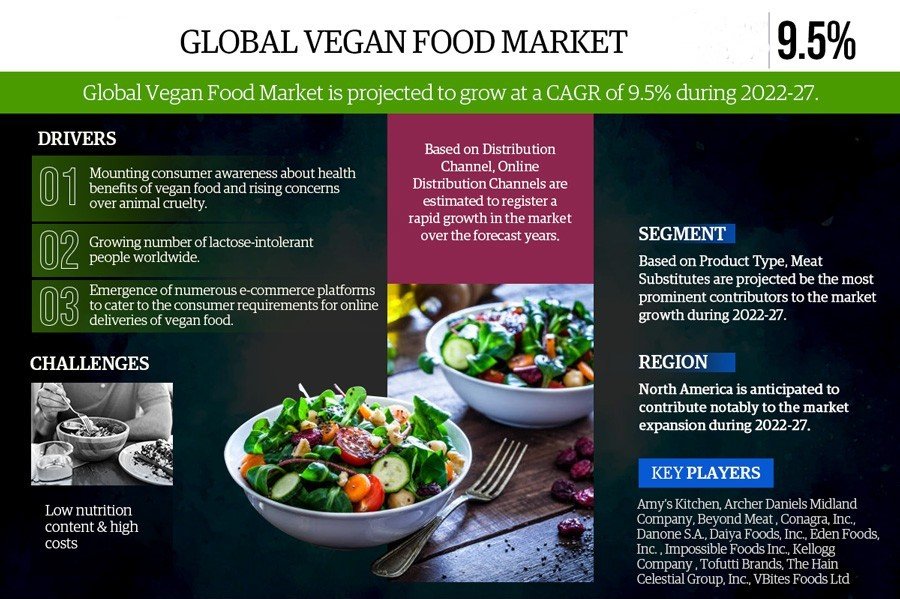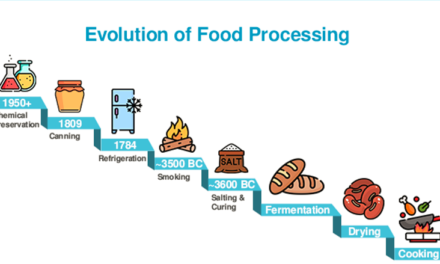Global food trends like veganism significantly impact manufacturing processes by driving innovation, reshaping supply chains, and requiring changes to production practices. As the demand for vegan and plant-based products grows, manufacturers must adapt to meet consumer expectations for taste, quality, and ethical standards while ensuring efficiency and compliance. Here’s how veganism affects manufacturing:
1. Reformulating Products
- Impact: Manufacturers need to replace animal-derived ingredients with plant-based alternatives.
- Challenges:
- Finding substitutes that replicate the taste, texture, and functionality of dairy, eggs, and meat.
- Maintaining product quality and shelf life with plant-based ingredients.
- Examples:
- Using aquafaba (chickpea water) as an egg white replacement.
- Replacing dairy with almond, oat, or pea protein in beverages and desserts.
- Utilizing soy, jackfruit, or mycoprotein in meat substitutes.
2. Dedicated Production Lines
- Impact: Vegan products often require separate manufacturing lines to avoid cross-contamination with animal-derived products.
- Challenges:
- High costs of setting up dedicated vegan production facilities.
- Scheduling and cleaning shared equipment to ensure compliance with vegan labeling standards.
- Solutions:
- Investment in dedicated vegan facilities or allergen-friendly zones.
- Implementation of rigorous cleaning protocols and allergen management systems.
3. Sourcing Plant-Based Ingredients
- Impact: Increased demand for plant-based ingredients like pea protein, coconut oil, and nutritional yeast has reshaped supply chains.
- Challenges:
- Securing a consistent supply of high-quality, non-GMO, and sustainably sourced ingredients.
- Managing rising ingredient costs due to growing demand.
- Solutions:
- Partnering with specialized suppliers and diversifying sourcing regions.
- Investing in vertically integrated supply chains to ensure stability.
4. Labeling and Certification
- Impact: Veganism requires precise labeling to communicate compliance with ethical standards.
- Challenges:
- Ensuring no animal-derived ingredients or cross-contamination during production.
- Navigating various vegan certification standards across regions (e.g., Vegan Society, Certified Vegan).
- Solutions:
- Regular audits and ingredient traceability systems.
- Clear communication with suppliers to verify compliance with vegan standards.
5. Product Innovation
- Impact: Veganism has accelerated innovation in food technology and product development.
- Challenges:
- Balancing cost, nutrition, and flavor to meet consumer expectations.
- Competing with traditional animal-based products in terms of taste and functionality.
- Examples:
- Developing plant-based cheeses that melt and stretch like dairy cheese.
- Creating vegan ice cream with creamy textures using coconut cream or cashew milk.
6. New Equipment and Processes
- Impact: Vegan food production often requires specialized machinery and techniques.
- Challenges:
- Adapting equipment to handle plant-based ingredients with different properties from animal-based ones.
- Ensuring flexibility to accommodate various plant-based formulations.
- Examples:
- Extruders for texturized vegetable protein in meat alternatives.
- Homogenizers for plant-based milk production to ensure smooth texture.
7. Focus on Clean Labels
- Impact: Vegan consumers often prioritize clean-label products with natural, recognizable ingredients.
- Challenges:
- Removing artificial additives and preservatives while maintaining product stability and flavor.
- Reformulating with fewer plant-derived ingredients.
- Examples:
- Using natural thickeners like guar gum or agar-agar instead of synthetic stabilizers.
- Highlighting organic and non-GMO certifications on packaging.
8. Sustainability and Carbon Footprint
- Impact: Veganism aligns with sustainability goals, influencing manufacturers to reduce their environmental impact.
- Challenges:
- Minimizing energy and water use in plant-based production.
- Managing packaging waste by transitioning to recyclable or biodegradable materials.
- Examples:
- Adopting carbon-neutral processes for producing vegan food.
- Using lightweight and compostable packaging for plant-based products.
9. Consumer Education
- Impact: Veganism has increased consumer demand for transparency about sourcing and production practices.
- Challenges:
- Providing clear information about ingredient origins and ethical considerations.
- Educating consumers about the nutritional benefits of plant-based products.
- Solutions:
- Incorporating QR codes or detailed product information on packaging.
- Collaborating with influencers and dietitians to promote vegan products.
10. Regulatory Compliance
- Impact: Governments and certification bodies are setting standards for vegan food labeling and production.
- Challenges:
- Adhering to regional regulations regarding vegan claims and allergen disclosures.
- Ensuring compliance with export requirements for international markets.
- Examples:
- Following FDA, EFSA, or regional guidelines for vegan labeling.
- Ensuring kosher or halal compliance for plant-based products in specific markets.
11. Market Diversification
- Impact: Veganism drives demand for alternative formats, cuisines, and cultural adaptations.
- Challenges:
- Developing vegan products that appeal to diverse cultural and regional tastes.
- Offering convenient formats like ready-to-eat meals and snacks.
- Examples:
- Vegan versions of global favorites like dumplings, sushi, or pizza.
- Pre-packaged vegan meal kits tailored to regional cuisines.
12. Collaboration and Partnerships
- Impact: Veganism encourages collaboration between startups, traditional manufacturers, and ingredient suppliers.
- Challenges:
- Balancing innovation speed with production scale and cost efficiency.
- Examples:
- Partnerships with food tech companies like Beyond Meat or Impossible Foods.
- Joint ventures between traditional meat producers and plant-based innovators.
Opportunities for Manufacturers
- Expanded Consumer Base: Catering to flexitarians, vegans, and environmentally conscious consumers.
- Higher Profit Margins: Premium pricing for plant-based products with health and ethical claims.
- Sustainability Leadership: Aligning with global sustainability goals to strengthen brand reputation.
Conclusion
Veganism is transforming manufacturing processes by encouraging innovation, sustainability, and greater transparency. Companies that adapt to these changes through investment in technology, supply chain diversification, and consumer education will be well-positioned to capitalize on the growing demand for plant-based products.
Hashtags
#VeganEats #EcoConsciousCuisine #MeatFreeMonday #SustainableEating #CleanEating #VeganLifestyle #FoodForThought #GreenEating #MeatlessMeals #EcoFriendlyEats #VeganCommunity #SustainableLiving #HealthyPlanetHealthyYou #CrueltyFreeFood #VeganForThePlanet #SustainableSolutions #FoodRevolution #PlantPowered #EthicalEating #VeganForLife









